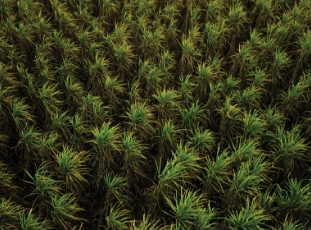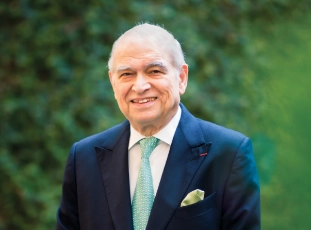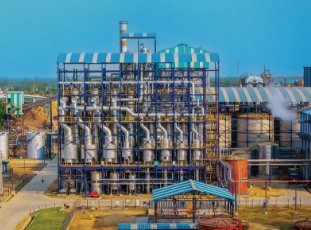Q&A with Vice Chairman & Managing Director
Resilient Performance, Lasting Impact
Our business diversification, combined with agile efforts like varietal substitution, driving operational efficiency, and prudent capital allocation and working capital management, ensured we deliver buoyant performance.
TARUN SAWHNEY
Vice Chairman & Managing Director

Looking back at FY 25, how would you review the overall performance of the Company? What were some of the key highlights during the year?
FY 25 was a year that exemplified our grit, resilience, and focus on value creation. We delivered steady performance despite a complex landscape and profitability challenges in the Sugar and Alcohol businesses, and a slowdown in the water business. That said, our business diversification, combined with agile efforts like varietal substitution, driving operational efficiency, and prudent capital allocation and working capital management, ensured we deliver buoyant performance. Overall, we closed the year with revenue from operations (net) of ₹ 5,689.2 crore, a 9% increase over the previous year. The growth was driven by higher revenues in sugar, alcohol and power transmission businesses. Revenue from the sugar business increased by 2.8% to ₹ 3,967 crore, supported by increased production and higher realisation due to firm prices. The revenue (net of excise) from the alcohol business rose 15.7% to ₹ 1,473.5 crore, driven by the commissioning of a new multi-feed distillery at Rani Nangal distillery and higher average realisations, with a large proportion of maize as feedstock in the product mix. In the engineering segment, our Power Transmission Business (PTB) delivered another year of stellar performance. The segment recorded a 26.8% increase in revenue to ₹ 369.9 crore, driven by growth in both product and aftermarket segments. FY 25 order booking grew 26.6% to ₹ 475.4 crore, while the closing order book increased 35.5% to an all-time high of ₹ 389.4 crore as on March 31, 2025, including long-duration orders of ₹ 178.3 crore. In the water business, a slowdown in the execution of certain projects and a delay in new project receipts resulted in a 4.9% decline in revenue to ₹ 234.2 crore. On the positive side, FY 25 order booking was strong at ₹ 586.2 crore, resulting in an outstanding order book of ₹ 1,600.8 crore as on March 31, 2025, which includes ₹ 1,120 crore towards O&M contracts for a longer period.
What were the profitability challenges that the Company faced, and how did they impact the bottom line?
The profitability was under pressure, primarily due to the external factors in the sugar and alcohol businesses. The segmental profit of the sugar business was lower by 12.8% due to the higher cost of production of sugar sold in FY 25. This included SS 2023-24 stock, with higher sugarcane prices, and current SS 2024-25 stock, when recovery rates were lower, both of which increased production costs. The segmental profit of the Alcohol business was significantly affected, given the higher share of ethanol production from low-margin maize feedstock and reduced volumes from molasses due to lower sugarcane crush. The business was also impacted by the temporary shutdown of plant operations owing to feedstock unavailability, during which the fixed costs continued to accrue. An increase in the internal transfer price of molasses and the net segment loss of Sir Shadi Enterprises Limited further contributed to the drag. Further, considering firm sugar prices, we switched operations in our sugar units (except one) to C-heavy molasses. While this improved the overall profitability of the Company, it reduced the profitability of the alcohol business. The power transmission business remained a strong pillar of profitability, offering stability and contributing meaningfully to our overall performance. Our sustained focus on seamless execution alongside a higher share of the aftermarket resulted in record profitability of ₹ 126.8 crore, an 18.4% increase over the previous year. Overall, our EBITDA were lower by 22.5% to ₹ 533.8 crore, with a margin of 9.4%. Profit after Tax was at ₹ 238.3 crore, 39.7% lower than the previous year.
Could you elaborate on the performance of the sugar and alcohol businesses and what factors impacted their performance?
There was a general trend of lower sugarcane crush and recoveries in the state of Uttar Pradesh in SS 2024-25. Inclement weather with heavy rainfall and waterlogging in certain regions, along with degeneration in Co0238 cane variety due to the spread of pests and red rot disease, considerably reduced the yields and recovery. The challenge was more intense in the low-lying areas prone to waterlogging. As for the sugar realisations, they were muted for most of the year due to soft sugar prices. It was only towards Q4 FY 25 that prices started to firm, on estimates of lower production in SS 2024-25 and the government’s timely announcement to allow ~1 million tonnes of sugar exports. The alcohol business was faced with significant challenges on the feedstock front. The government’s policy decision to restrict the sugar diversion to B-heavy and sugarcane juice during the H1 FY 25 led to a shortage of molasses-based feedstock. Resultantly, some of our distilleries remained closed for some time, impacting production. Furthermore, given the restrictions on the use of high-margin FCI Rice for ethanol production, a high proportion of our operations needed to be carried out with low-margin maize as a feedstock, which impacted profitability.
What strategic measures did the Company undertake to build resilience and sustain momentum in the sugar and alcohol businesses?
In the face of challenges, we undertook proactive actions targeting three critical levers - raw material availability, scaling operational efficiency, and enhancing crop yield and recovery. These deliberate and well-calibrated actions, while supporting operations during the year, pave the way for long-term resilience and enhance business sustainability. Starting with raw material availability, which is primarily sugarcane. Over the last two years, there has been a marked degradation in the Co0238 variety due to infestation of red rot disease. To overcome this challenge, we have been working on a multi-pronged strategy to improve performance through a continued push for varietal substitution. A significant success was achieved in FY 25, as we reduced the proportion of this vulnerable variety from 75% to 40%, especially in low-lying and water-logging prone areas. These were substituted with other high-sucrose and high-yield varieties. Additionally, we have significantly enhanced our focus on crop protection through rigorous surveillance and large-scale prevention. We undertook extensive farmer engagement, especially on nurtured demo plots to showcase higher yields, through superior agronomic practices. Apart from that, farmers were supported with advanced digital tools, including AI/ML, satellite surveillance, and drone-based sprays. Our Cane portal ensured continued support, providing services and addressing their queries instantly at their fingertips. These targeted measures improved raw material availability across both sugar and alcohol businesses. On one hand, higher cane availability supported increased crushing at our sugar units, and on the other, it led to enhanced molasses generation, which is an essential and high-margin feedstock for distilleries. On the operational efficiency front, we undertook capital investments in plant modernisation. We successfully installed one of the largest cane crushing mills of size 50”x100” at the Sabitgarh unit, which enhanced cane crushing and reduced bagasse loss. At Khatauli, the EC-type turbine at phase 1 cogen was replaced with a backpressure turbine. This enhances bagasse savings. At the Deoband unit, we stabilised the evaporators that were installed in the previous year, resulting in a reduction in process steam consumption and bagasse savings. Both Khatauli and Deoband put together, along with our subsidiary’s Shamli unit, we are now comfortably placed to meet the fuel requirement for the adjacent Muzaffarnagar distillery. At the Ramkola unit, an additional mill was added to the existing milling tandem, further enhancing its performance. Happy to note that these efforts resulted in superior crushing performance at three of our large units of Khatauli, Sabitgarh and Deoband, offsetting the decline in the remaining units. Overall, we registered a 9.6% increase in sugarcane crush to 9.05 million tonnes and a 2.9% increase in sugar production to 9.16 lakh tonnes in SS 2024-25. Alcohol production increased by 8.5% to over 20 crore litres.
What progress did the Company make in the liquor business? Do you see them as an engine of growth?
The liquor business serves as a forward integration of our distillery operations and provides better margins. If you look at our country liquor or Indian Made Indian Liquor (IMIL) business, we have quickly consolidated our position to become the fifth-largest player in the state of Uttar Pradesh. This business is progressing well with sustained strong demand for our products. In FY 25, we registered 24.5% higher despatches at 55.7 lakh cases as compared to 44.7 lakh cases in FY 24. Building on this foundation, we have successfully ventured into the Indian Made Foreign Liquor (IMFL) segment. During the year, we launched two premium grades of whiskies, Matsya and The Crafters Stamp. The initial reception of the products has been encouraging. In fact, they went on to win reputed awards like Spiritz Achievers Awards 2024, INDSPIRIT 2025 and World Whiskies Award Design. Though these are early days, we are confident in building these brands with focussed marketing efforts. Both these ventures align with our overall vision and strategy to diversify operations and add more adjacencies to ensure sustained value creation. We have in place a long-term vision for these ventures and the focus will be on execution.
Could you elaborate on the performance of the Power Transmission business?
Power Transmission Business reported exceptional performance during the year, setting new benchmarks. But importantly, the year marked a milestone in our international endeavours, as we successfully cleared stringent qualification processes and executed initial orders. Our products are now qualified by all major global OEM customers, reinforcing our credibility and acceptance in the international markets. We leveraged this to amplify our export focus and increased customer engagements, resulting in growth in the export and aftermarket segments. In the defence segment, we won two prestigious orders from Mazagon Dock Shipbuilders for propulsion shafting and indigenous gearboxes. This highlights the growing confidence of customers in our ability to provide complex engineered products and solutions. The development of our new multi-modal facility for defence products is in progress, which on completion will help in gaining the confidence of customers and expanding our service offering. Overall, we have witnessed healthy demand from traditional segments and markets while making strides with new customers in global markets, along with portfolio diversification. Considering the immense growth prospects, we have enhanced capex commitment in the business to scale up operations to an annual capacity in the Gears segment alone to ₹ 700 crore (up from ₹ 400 crore presently) by September 2026.
Could you share your views on the external environment and the Company’s growth trajectory in the coming year?
We enter FY 26 with a sense of optimism and confidence. The monsoon for the upcoming season seems good, with forecasts to be in excess of 114% of the long period average. This bodes well for the industry if the rainfall is spread out over the period. We expect a significant improvement in cane availability and yields given our efforts around varietal change, better agronomy practices and farmer engagement. This is likely to improve crushing performance and sugar production. At the same time, it will improve molasses availability for the distilleries, which will be key to reviving profitability in the business. We are also working on improving the procurement, supply chain, and storage in grains operations to improve its margin structure. In the power transmission business, our competitive technology, cost and quality leadership and qualifications by major global OEMs remain a key driver of our leadership in both domestic and international markets. With intensified marketing efforts globally and ongoing capacity enhancements, we are positioned for sustained growth. The tailwinds from India's economic growth, infrastructure development and the focus on promoting India as a global manufacturing hub are likely to be a plethora of opportunities for indigenisation of imported gearbox installations. In the water business, we expect new opportunities in recycled, reuse, and zero liquid discharge businesses, both on EPC and PPP models, supported by extensive funding support from state and central governments. We are also evaluating international opportunities in water and wastewater treatment, where we possess pre-qualifications. Overall, we are well-placed for growth with various proactive measures to overcome bottlenecks and seize newer opportunities. We expect these efforts to drive profitable growth and returns for our shareholders in the long term.
What does the proposed Composite Scheme of Arrangement entail? What implications would it have on the long-term value creation for shareholders?
The Composite Scheme involves simplifying the corporate structure. It includes, firstly, an amalgamation with our subsidiary Sir Shadi Lal Enterprises (SSEL), where we own a ~61.77% stake. This will enable driving synergies between our sugar units and distilleries. The strategic location of SSEL’s units in Shamli district, which is one of the most high-yielding locations, further gives an advantage. The second is the demerger and transfer of our Power Transmission Business to our wholly-owned subsidiary Triveni Power Transmission Limited. This will allow each of the independent businesses to sharpen their focus and organise activities and resources to improve customer offerings. Together, we expect the move to enhance value discovery and operational efficiencies, reflecting our ongoing commitment to sustainable growth and long-term returns to our stakeholders. Currently, the scheme is awaiting approval from SEBI, following which we will seek NCLT approval.
© 2025 Triveni Engineering & Industries Ltd.
All Rights Reserved


